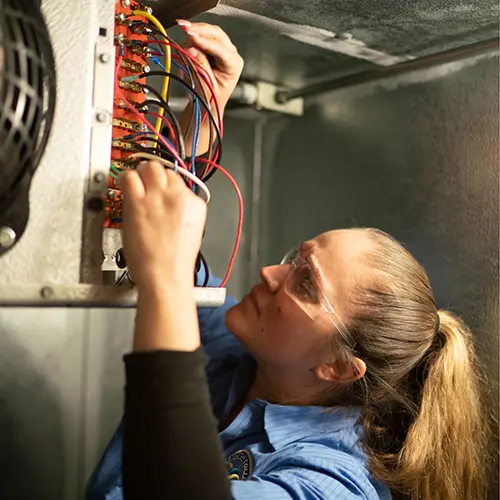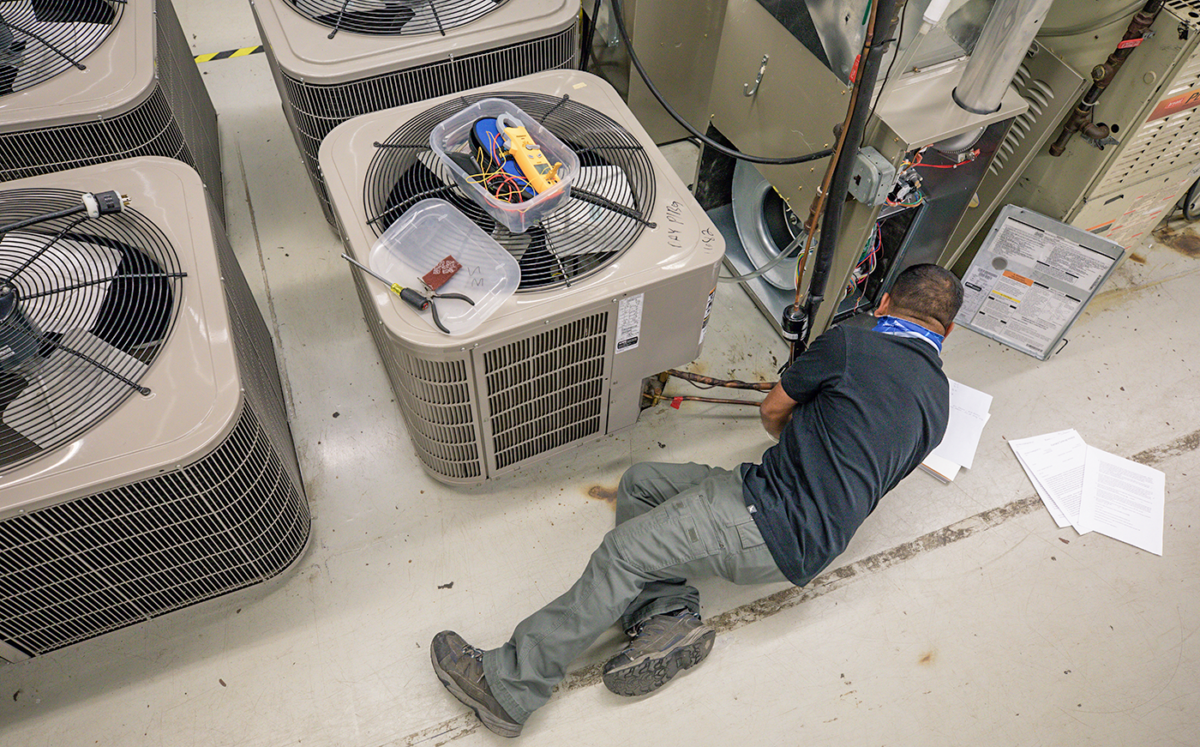Commercial HVAC Contractor Offering Specialist Cooling And Heating Solutions
Commercial HVAC Contractor Offering Specialist Cooling And Heating Solutions
Blog Article
A Thorough Check Out Heating And Cooling Solutions and Their Influence On Energy Effectiveness and Price Financial Savings
With technical improvements like smart thermostats and high-efficiency components, the potential for enhancing system efficiency is large. As we check out the complex partnership in between Heating and cooling systems and functional expenses, including the shift towards ecologically friendly alternatives, the question occurs: exactly how can these strategies be properly applied to make the most of both eco-friendly and economic advantages?

Importance of HVAC Equipments
HVAC systems are a crucial part of contemporary buildings, playing an essential function in preserving comfy and healthy and balanced interior environments. These systems, including heating, ventilation, and air conditioning, are crucial for controling temperature level, moisture, and air high quality, therefore guaranteeing the health of residents. Effective a/c systems contribute considerably to producing an optimal interior environment, which is essential for both household and commercial spaces.
In commercial buildings, cooling and heating systems are integral to giving a efficient and risk-free setting. By regulating interior climate problems, these systems aid stop the growth of mold and the spread of airborne pollutants, thus safeguarding the health and wellness of consumers and workers. In addition, in domestic settings, HVAC systems enhance living problems by supplying constant thermal comfort and enhancing indoor air high quality, which is crucial for general wellness.
In addition, the layout and upkeep of cooling and heating systems have a straight influence on energy consumption and functional expenses. Properly created and kept systems can dramatically reduce power use, bring about lowered utility bills and a smaller carbon footprint. The efficiency of these systems therefore plays an important role in advertising sustainability and power conservation within structures, highlighting their relevance in the modern architectural landscape.
Advances in Heating And Cooling Innovation
Advancement in cooling and heating modern technology is changing the way buildings take care of indoor environments, ushering in a brand-new era of performance and control. Current advancements have concentrated on optimizing power intake while improving individual convenience. One notable growth is the integration of wise thermostats, which utilize man-made intelligence to find out tenancy patterns and adjust temperature levels as necessary, minimizing unneeded energy usage.
Variable Cooling Agent Circulation (VRF) systems represent an additional substantial jump onward. These systems permit accurate temperature level control in different areas of a building, boosting convenience and decreasing energy waste. VRF modern technology is particularly helpful for large industrial spaces, using adaptability and scalability.
Furthermore, the development of Net of Points (IoT) devices has actually transformed HVAC systems into interconnected networks efficient in real-time data collection and evaluation. This connectivity allows predictive upkeep, making certain systems run at peak efficiency and reducing unanticipated downtime.
Moreover, innovations in products and style, such as the usage of high-efficiency coils and compressors, have actually boosted overall system efficiency - Heating Contractor. The fostering of environmentally friendly cooling agents also highlights the industry's dedication to sustainability
These technological innovations are critical in reducing operational prices and environmental effect, establishing brand-new requirements for developing climate administration.
A/c Upkeep and Effectiveness
Ensuring ideal performance of heating and cooling systems extends past technical developments; it additionally depends upon effective maintenance methods. Normal upkeep is essential for sustaining efficiency, lowering power consumption, and prolonging the lifetime of HVAC systems. The key objective is to make certain mini split hvac system that all elements operate at their peak potential, thereby lessening energy wastefulness and preserving constant interior comfort levels.
Routine upkeep tasks, such as cleaning or replacing air filters, examining refrigerant degrees, and checking ductwork for leakages, are necessary for protecting against unnecessary pressure on the system. Filthy or clogged filters can obstruct air movement, triggering the system to work harder and take in more energy. Similarly, inadequate refrigerant degrees can lower cooling down effectiveness, leading to greater operational costs.
Additionally, regular examinations by qualified specialists can identify prospective problems prior to they rise right into expensive repair services or system failings. anytime heating and air These examinations usually include inspecting electrical connections, calibrating thermostats, and making sure the general honesty of the cooling and heating system. By attending to small problems early, businesses and house owners can stay clear of unanticipated failures and boost energy efficiency.
Economical Heating And Cooling Solutions
For those aiming to obtain one of the most out of their air, home heating, and air flow conditioning systems without breaking the bank, checking out economical a/c services can make a substantial difference. One prompt measure is to spend in programmable thermostats, which allow individuals to set specific temperatures for different times of the day, maximizing power usage and minimizing unnecessary usage. By automating temperature changes, homeowners can achieve considerable financial savings on energy expenses.
Regular upkeep is one more essential part of cost-effective heating and cooling monitoring. Guaranteeing that filters are cleaned or changed on a regular basis, ductwork is secured, and systems are serviced by experts can prevent costly fixings and improve system durability. Precautionary upkeep not just preserves system performance but likewise assists in staying clear of unanticipated failures that can bring about pricey emergency situation fixings.
Additionally, retrofitting existing systems with energy-efficient components, such as variable rate mini duct hvac electric motors or high-efficiency compressors, can be a prudent financial investment. These upgrades boost operational effectiveness, lower energy usage, and can frequently be implemented at a fraction of the price of a complete system replacement.
Environmental Effect Decrease
Decreasing the environmental impact of Heating and cooling systems is critical in today's pursuit of lasting living. A/c systems are considerable factors to power usage, accounting for virtually 40% of power use in industrial structures.
Technical improvements in heating and cooling design and procedure, consisting of the combination of wise thermostats and energy-efficient warmth pumps, are critical in lowering carbon footprints. These advancements enable maximized energy usage, minimizing wastage and enhancing overall system performance. In addition, embracing routine maintenance methods guarantees heating and cooling systems operate at peak efficiency, more cutting unneeded power usage.
Furthermore, using eco-friendly refrigerants is vital, as typical refrigerants, like CFCs and HCFCs, have been terminated due to their ozone-depleting homes. Modern alternatives, such as hydrofluoroolefins (HFOs), offer minimized environmental threats, straightening with international environmental protocols. By accepting these sustainable practices, heating and cooling solutions can play a transformative function in lowering ecological influences, advertising energy performance, and fostering an extra sustainable future.
Verdict

In addition, the design and upkeep of HVAC systems have a straight effect on energy intake and operational expenses. Routine maintenance is critical for sustaining performance, reducing energy consumption, and expanding the life period of Cooling and heating systems. HVAC systems are considerable contributors to energy consumption, accounting for almost 40% of energy usage in industrial structures. Additionally, embracing routine maintenance practices makes certain A/c systems run at peak efficiency, additional cutting unnecessary energy intake.
The change to environmentally friendly HVAC systems additionally advertises and minimizes functional expenses sustainability. (Heating Contractor)
Report this page